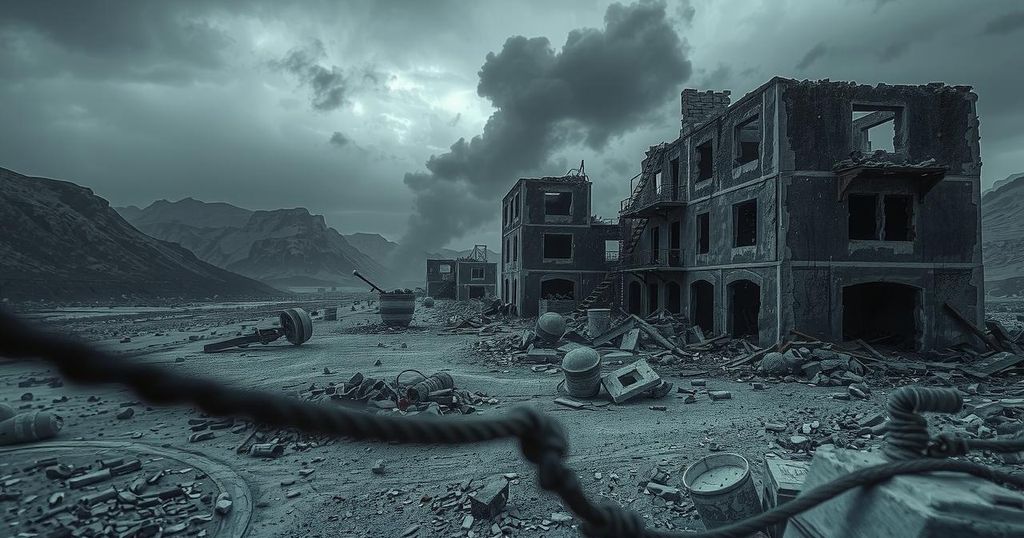Sudan’s Civil War: A Potential Turning Point Amidst Humanitarian Crisis

The civil war in Sudan is witnessing a shift in military fortunes as General Abdel Fattah al-Burhan’s forces reclaim key areas, including the presidential palace. Despite this, the RSF continues to hold significant territories, and humanitarian conditions remain dire amid international neglect and a lack of effective diplomatic resolutions. The conflict’s repercussions are also felt in South Sudan, where tensions rise as violence escalates.
The ongoing civil war in Sudan has not seen effective international diplomatic resolutions; however, recent developments indicate a shift in military control. Forces loyal to General Abdel Fattah al-Burhan, the army chief, have regained the presidential palace in Khartoum from the Rapid Support Forces (RSF), a paramilitary faction led by General Mohamed Hamdan Dagalo, known as Hemedti. This recovery follows a period where RSF had initially captured key positions in the city after their alliance with Burhan fractured in April 2023.
In a strategic offensive, Burhan’s forces have reclaimed significant areas, including the central bank of Sudan, while reports of heightened shelling have emerged from the city of Omdurman, adjacent to Khartoum. Their success has been attributed to the RSF’s supply challenges and support from drone technology provided by Iran and Turkey. A military spokesperson heralded the capture of the presidential palace as a symbol of Sudanese sovereignty and dignity.
The civil conflict has resulted in widespread atrocities, with rights organizations reporting heinous acts committed by both factions. The outgoing U.S. administration imposed sanctions on Hemedti, condemning the RSF’s involvement in mass violence against non-Arab ethnic groups in the Darfur region. Aid organizations face extreme difficulties delivering humanitarian assistance amidst the violence and territorial divisions created by various armed groups.
Allegations persist regarding RSF support from the United Arab Emirates, despite the UAE’s denial, and the Sudanese military has received backing from Egypt, Turkey, and Iran. Several attempts to broker ceasefires have been futile, as temporary truces are often quickly violated. Although Burhan’s forces may currently appear to hold an advantage, the RSF remains active in and around Khartoum, controlling extensive territories in southern and western Sudan.
The crisis in Sudan has significantly impacted neighboring South Sudan, exacerbating tensions and threatening its fragile power-sharing agreement. Increased violence in South Sudan has led to foreign nations evacuating personnel from its capital, and UN officials have raised alarms about the risk of renewed civil war.
The international community has largely overlooked the dire humanitarian situation in both Sudan and South Sudan. Reports highlight that the United Nations’ humanitarian response for Sudan has only reached 6.63% of the necessary funding, reflecting a significant shortfall. Delays in humanitarian initiatives continue to plague efforts, causing profound consequences on the ground as local organizations report rising hunger and critical shortages in healthcare resources.
Concerns have been raised regarding the U.S. administration’s substantial cuts to foreign assistance, which plays a crucial role in alleviating these crises. Analysts point to a concerning trend of reallocating funds toward defense rather than humanitarian aid, compounding the suffering of millions in Sudan. Kholood Khair, the founder of Confluence Advisory, emphasized the detrimental impact of U.S. aid reductions, highlighting that “it’s difficult to overstate how devastating the USAID cut will be for Sudan.”
In summary, while recent military successes suggest a potential turning point in Sudan’s civil war, the broader context reveals entrenched conflicts and humanitarian crises worsened by international inaction. The RSF continues to control large territories, and external support dynamics complicate the situation further. The humanitarian response remains critically underfunded, leading to alarming conditions for the affected populations, particularly as cuts to U.S. aid threaten relief efforts.
Original Source: www.washingtonpost.com








